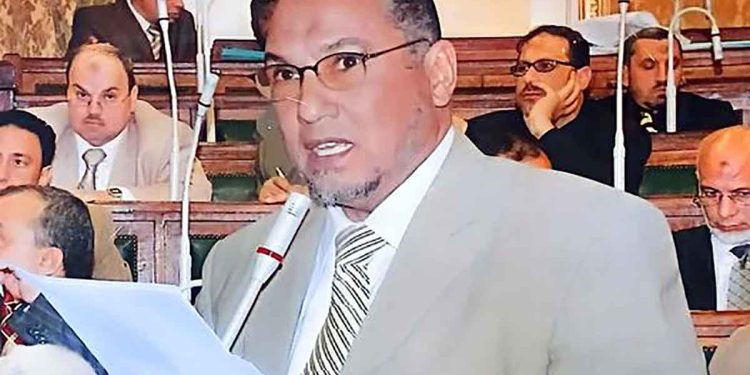As the Egyptian regime continues its violations against political detainees, victims continue to lose their lives due to the policy of deliberate medical negligence and poor detention conditions.
The Egyptian political prisoner, Al-Mohammadi Mohamed Abdel Maqsoud Al-Ghannam, died at the age of 79, due to deliberate medical negligence in Wadi Al-Natroun prison.
The health of Abdel Maqsoud, a former member of the parliament, deteriorated significantly, and he was transferred to Shebin al-Koum Teaching Hospital before he died.
Egyptian security forces arrested Al-Mohammadi from his home on August 24, 2013, and was sentenced to death along with 6 other detainees in the storming of the Helwan Police Department case.
On June 6, 2020, the Court of Cassation upheld the criminal ruling against 7 defendants with death by hanging, life imprisonment for 50 others, 7 years’ aggravated imprisonment for 10 defendants, and 5 years’ imprisonment for 3 others in the case known in the media as the storming of the Helwan Police Department on August 14, 2013.
Al-Mohammadi was an MP between 2005 and 2010, and President of the Local Popular Council of Helwan District from 1992 to 1996, then Chairman of the Interim People’s Committee of the Local Popular Council of Helwan District from 1997 to 1998. He was Secretary-General of the Labor Party in Helwan in 1994, and Secretary-General of the Labor Party in southern Cairo in 1995.
He was also a member of the Supreme Committee of the Labor Party from 1995 until its suspension, a member of the Executive Committee of the Labor Party from 1998 until its suspension, and head of the Sharia Society, Al-Hadi Branch, from 1971 to 1990.
Al-Mohammadi is the 13th detainee that died in Egyptian prisons and detention centres this year.
In 2023, 32 detainees died in prison, most of whom are politicians who died of medical negligence and the lack of health and medical care.
Al-Mohammadi’s death highlights the dire human rights situation in Egypt, where detainees and convicts suffer from horrific detention conditions and ongoing violations of their basic rights.
His death due to deliberate medical negligence proves the failure of the Egyptian authorities to provide the necessary medical care to detainees, which is a flagrant violation of international law.
This tragic event requires human rights and international NGOs to put pressure on the Egyptian government to protect detainees and convicts, provide adequate medical care for them inside prisons, investigate death cases, bring those responsible to justice, and ensure that such incidents will not be repeated in the future.
Egyptian prisons generally lack basic health requirements, including good food, health services, and adequate bathrooms for the large number of prisoners. It also lacks good lighting, ventilation, and detainees are deprived of exercising. Furthermore, most of the Egyptian prisons and places of detention suffer from severe overcrowding of prisoners.






























